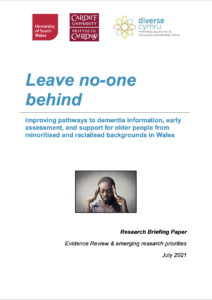Leave no-one behind: Improving pathways to dementia information, early assessment, and support for older people from minoritised and racialised backgrounds in Wales
An estimated 25,000 people of Black, Asian and Minority Ethnic (BME) origins live with dementia in the UK – a number which is expected to increase sevenfold by 2051. People from many minoritised communities experience dementia in a markedly different way to their white British counterparts. This report provides a scoping overview of the evidence base, summaries of recently completed scoping studies and engagement work in Wales.
More Time: cultural competence and person-centred dementia care in community settings
This performance is based on testimonials of Black, Asian and Minority Ethnic professionals and carers. It highlights the importance of culturally appropriate care and the ways that institutionalised task-orientated cultures and punishing workloads contribute to poor care and elderly neglect.
Next of Kin: D/deaf communication, dementia care and family in hospital settings
This performance is based on testimonials of Deaf people who use BSL and hard of hearing carers. It highlights the difficulties in communication faced by the next of kin of people living with dementia and how lack of interpretation and good communication deprived them of their right to be equally involved in the end of their loved one’s life.
Back In The Closet: homophobia, human rights and organisational cultures of dementia care
This performance is based on testimonials of LBGTQI+ professionals, carers and people with dementia. It highlights the impact of heteronormative language and discriminatory behaviours on the quality of life and human rights of LGBTQI+ people with dementia and their partners in later life.
Equality, Diversity and Inclusion in dementia care
This digital story outlines some of the key unaddressed issues regarding equalities in dementia care. We know that dementia care is complex and that it is even more complex for minority groups who have experiences of discrimination. This series of 5 digital stories on equalities in dementia care aims to increase awareness about some of the issues experienced by under-represented groups and contribute improvements in dementia care.
Ethnicity and language in dementia care
This digital story highlights issues in the care of people with dementia who are native Welsh and Greek speakers and who might revert to their native tongue during the late stages of their dementia. It also brings to the attention of viewers experiences of racism faced by elders of the Afro-Caribbean community.
Disability and hearing loss in dementia care
This digital story highlights issues in dementia care experiences of people with hearing and sight loss and those with Down’s Syndrome.
LGBT issues in dementia care
This digital story highlights the impact of homophobic microaggressions on LGBT+ experiences of dementia care.
Advice on creating more equitable dementia care
This digital story offers advice to students and professionals in health and social care based on personal experiences of people from under-represented groups in relation to ethnicity, language, disability and sexuality.
BSL communication and experiences of accessing healthcare
In this video interview Michelle Fowler, native BSL user and mental health advocate for the British Deaf Association is providing an overview of BSL users’ issues when accessing healthcare. The following topics are covered: BSL communication & primary healthcare (Going to see the GP, Wales Standard for Accessible Communication), BSL communication and secondary care – going to the hospital (Problems with interpreters, Use of Video Relay Service).
BSL communication and dementia care
In this video interview Michelle Fowler, native BSL user and mental health advocate for the British Deaf Association is providing an overview of BSL users’ experiences of dementia care. The following topics are covered: Diagnostic tests, Accessing secure environments, Communicating with people with late-stage dementia, Dementia, stroke and DNR, Impact of communication deprivation, Independent Mental health Care Advocate (IMCA) and BSL competence.
